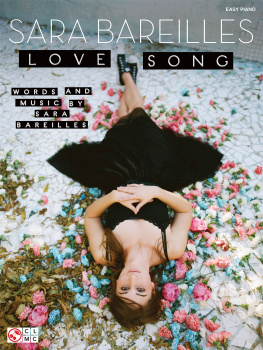Adrienne Trier-Bieniek - Sing Us a Song, Piano Woman: Female Fans and the Music of Tori Amos
Here you can read online Adrienne Trier-Bieniek - Sing Us a Song, Piano Woman: Female Fans and the Music of Tori Amos full text of the book (entire story) in english for free. Download pdf and epub, get meaning, cover and reviews about this ebook. year: 2013, publisher: Scarecrow Press, genre: Home and family. Description of the work, (preface) as well as reviews are available. Best literature library LitArk.com created for fans of good reading and offers a wide selection of genres:
Romance novel
Science fiction
Adventure
Detective
Science
History
Home and family
Prose
Art
Politics
Computer
Non-fiction
Religion
Business
Children
Humor
Choose a favorite category and find really read worthwhile books. Enjoy immersion in the world of imagination, feel the emotions of the characters or learn something new for yourself, make an fascinating discovery.
- Book:Sing Us a Song, Piano Woman: Female Fans and the Music of Tori Amos
- Author:
- Publisher:Scarecrow Press
- Genre:
- Year:2013
- Rating:3 / 5
- Favourites:Add to favourites
- Your mark:
Sing Us a Song, Piano Woman: Female Fans and the Music of Tori Amos: summary, description and annotation
We offer to read an annotation, description, summary or preface (depends on what the author of the book "Sing Us a Song, Piano Woman: Female Fans and the Music of Tori Amos" wrote himself). If you haven't found the necessary information about the book — write in the comments, we will try to find it.
The result of this study is Sing Us a Song, Piano Woman: Female Fans and the Music of Tori Amos. Released on June 16, 2013, this book explores the many-layered relationships female fans build with feminist musicians in general and with Tori Amos, in particular. Using original interview research with more than forty fans of Tori Amos, multiple observations at Amoss concerts and an analysis of Amoss lyrics, Adrienne Trier-Bieniek employs a combination of gender, emotions, music, and activism to unravel the typecasts plaguing female fans. Trier-Bieniek aggressively challenges the popular culture stereotypes that have painted all female fans as screaming, crying teenage girls who are unable to control themselves when a favorite (generally male) performer occupies the stage. In stunning contrast, admirers of Tori Amos tend to be more reflective. Sing Us a Song, Piano Woman examines the wide range of stories, exploring how Amoss female fans are unique because Amos places the experiences of women at the center of her songwriting and musical composition. The result? A legion of female fans whose experiences with assault, eating disorders, miscarriage and other traumas have left them hunting for music that will help them rebuild -- and in Tori Amoss songs, they find it.
At a time when superficial women dominate public media presentations, from the Kardashians to the Real Housewives, the relationship between Tori Amos and her fans illustrates the continuous search by women for female performers who challenge patriarchal standards in popular culture. Trier-Bienieks research shows that women want to see their identity reflected in the women who dominate pop culture. Academically, Sing Us a Song, Piano Woman will serve as a contribution to research aimed at gender, sociology, feminist methodology, pop culture, social psychology, emotions, culture, womens studies and health/healing.
Adrienne Trier-Bieniek: author's other books
Who wrote Sing Us a Song, Piano Woman: Female Fans and the Music of Tori Amos? Find out the surname, the name of the author of the book and a list of all author's works by series.











 TM The paper used in this publication meets the minimum requirements of American National Standard for Information Sciences Permanence of Paper for Printed Library Materials, ANSI/NISO Z39.48-1992.
TM The paper used in this publication meets the minimum requirements of American National Standard for Information Sciences Permanence of Paper for Printed Library Materials, ANSI/NISO Z39.48-1992.